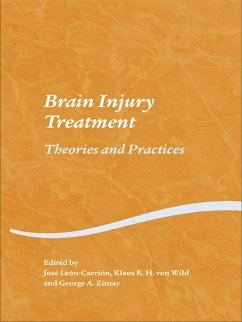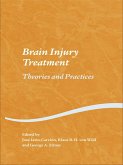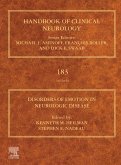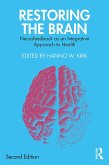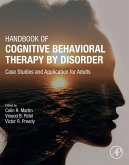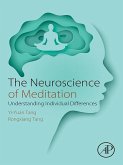Jose Leon-Carrion, Klaus R. H. von Wild, George A. Zitnay
Brain Injury Treatment (eBook, ePUB)
Theories and Practices
34,95 €
34,95 €
inkl. MwSt.
Sofort per Download lieferbar

17 °P sammeln
34,95 €
Als Download kaufen

34,95 €
inkl. MwSt.
Sofort per Download lieferbar

17 °P sammeln
Jetzt verschenken
Alle Infos zum eBook verschenken
34,95 €
inkl. MwSt.
Sofort per Download lieferbar
Alle Infos zum eBook verschenken

17 °P sammeln
Jose Leon-Carrion, Klaus R. H. von Wild, George A. Zitnay
Brain Injury Treatment (eBook, ePUB)
Theories and Practices
- Format: ePub
- Merkliste
- Auf die Merkliste
- Bewerten Bewerten
- Teilen
- Produkt teilen
- Produkterinnerung
- Produkterinnerung

Bitte loggen Sie sich zunächst in Ihr Kundenkonto ein oder registrieren Sie sich bei
bücher.de, um das eBook-Abo tolino select nutzen zu können.
Hier können Sie sich einloggen
Hier können Sie sich einloggen
Sie sind bereits eingeloggt. Klicken Sie auf 2. tolino select Abo, um fortzufahren.

Bitte loggen Sie sich zunächst in Ihr Kundenkonto ein oder registrieren Sie sich bei bücher.de, um das eBook-Abo tolino select nutzen zu können.
Explains the treatments used in brain injury rehabilitation and covers new methods of rehabilitation, including complementary medicine theories.
- Geräte: eReader
- mit Kopierschutz
- eBook Hilfe
- Größe: 7.06MB
Andere Kunden interessierten sich auch für
![Brain Injury Treatment (eBook, PDF) Brain Injury Treatment (eBook, PDF)]() Jose Leon-CarrionBrain Injury Treatment (eBook, PDF)34,95 €
Jose Leon-CarrionBrain Injury Treatment (eBook, PDF)34,95 €![Schizophrenia (eBook, ePUB) Schizophrenia (eBook, ePUB)]() Matcheri S. KeshavanSchizophrenia (eBook, ePUB)35,95 €
Matcheri S. KeshavanSchizophrenia (eBook, ePUB)35,95 €![Disorders of Emotion in Neurologic Disease (eBook, ePUB) Disorders of Emotion in Neurologic Disease (eBook, ePUB)]() Disorders of Emotion in Neurologic Disease (eBook, ePUB)176,95 €
Disorders of Emotion in Neurologic Disease (eBook, ePUB)176,95 €![Restoring the Brain (eBook, ePUB) Restoring the Brain (eBook, ePUB)]() Restoring the Brain (eBook, ePUB)40,95 €
Restoring the Brain (eBook, ePUB)40,95 €![Handbook of Cognitive Behavioral Therapy by Disorder (eBook, ePUB) Handbook of Cognitive Behavioral Therapy by Disorder (eBook, ePUB)]() Handbook of Cognitive Behavioral Therapy by Disorder (eBook, ePUB)161,95 €
Handbook of Cognitive Behavioral Therapy by Disorder (eBook, ePUB)161,95 €![The Neuroscience of Meditation (eBook, ePUB) The Neuroscience of Meditation (eBook, ePUB)]() Yi-Yuan TangThe Neuroscience of Meditation (eBook, ePUB)64,95 €
Yi-Yuan TangThe Neuroscience of Meditation (eBook, ePUB)64,95 €![Medicinal Usage of Cannabis and Cannabinoids (eBook, ePUB) Medicinal Usage of Cannabis and Cannabinoids (eBook, ePUB)]() Medicinal Usage of Cannabis and Cannabinoids (eBook, ePUB)161,95 €
Medicinal Usage of Cannabis and Cannabinoids (eBook, ePUB)161,95 €-
-
-
Explains the treatments used in brain injury rehabilitation and covers new methods of rehabilitation, including complementary medicine theories.
Dieser Download kann aus rechtlichen Gründen nur mit Rechnungsadresse in A, B, BG, CY, CZ, D, DK, EW, E, FIN, F, GR, HR, H, IRL, I, LT, L, LR, M, NL, PL, P, R, S, SLO, SK ausgeliefert werden.
Produktdetails
- Produktdetails
- Verlag: Taylor & Francis eBooks
- Seitenzahl: 608
- Erscheinungstermin: 27. September 2006
- Englisch
- ISBN-13: 9781135420710
- Artikelnr.: 42718784
- Verlag: Taylor & Francis eBooks
- Seitenzahl: 608
- Erscheinungstermin: 27. September 2006
- Englisch
- ISBN-13: 9781135420710
- Artikelnr.: 42718784
- Herstellerkennzeichnung Die Herstellerinformationen sind derzeit nicht verfügbar.
Jose Leon-Carrion is Professor of Neuropsychology and Director of the Human Neuropsychology Laboratory at the University of Seville, Spain. At the Center for Brain Injury Rehabilitation (C.RE.CER.) in Seville, an interdisciplinary center for rehabilitation, he is responsible for the design of the rehabilitation programs and director of the Department of Research, Development and Innovation. He was vice-president of the International Brain Injury Association (IBIA) and is currently Secretary General on the Board of Directors of IBIA. He also was president of the Academy for the Advancement of Brain Injury Rehabilitation.
George A. Zitnay is Clinical Professor at the Medical College of Virginia, he is the immediate past President of the Brain Injury Association of America, Founder and immediate past President of the International Brain Injury Association, Chairman of the WHO Neurotrauma Committee, former Chairman of the Council of the Medical Rehabilitation Center at NIH, Chairman of the National Brain Injury Research, Treatment and Training Foundation, former Professor and Director of Research at the Department of Neurosurgery at the University of Virginia, author, lecturer and member of editorial board of journal, Brain Injury.
Klaus von Wild is Professor and Head Neurosurgical, Department for Neurosurgery and Early Neurotraumatological Rehabilitation, Clemenshospital, Teaching Hospital, Westphalian Wilhelms University Munster.
George A. Zitnay is Clinical Professor at the Medical College of Virginia, he is the immediate past President of the Brain Injury Association of America, Founder and immediate past President of the International Brain Injury Association, Chairman of the WHO Neurotrauma Committee, former Chairman of the Council of the Medical Rehabilitation Center at NIH, Chairman of the National Brain Injury Research, Treatment and Training Foundation, former Professor and Director of Research at the Department of Neurosurgery at the University of Virginia, author, lecturer and member of editorial board of journal, Brain Injury.
Klaus von Wild is Professor and Head Neurosurgical, Department for Neurosurgery and Early Neurotraumatological Rehabilitation, Clemenshospital, Teaching Hospital, Westphalian Wilhelms University Munster.
Prehospital Management of Traumatic Brain Injury. Mild Brain Injury:
Detecting High Risk Patients. Organization of Neurological Intensive Care
Units. Current Concepts and Strategies on Early Neurohabilitation for
Patients with Traumatic Injury (TBI). Electrical Treatment of Coma.
Low-level responsive states. Diagnosing and treating affective disorders
after brain injury, Sleep Disorders in Patients with Traumatic Brain
Injury. Rehabilitation of Equilibrium and Posture Control after Brain
Injury. Neuropharmacological Management of Impairment after Traumatic Brain
Injury. Spasticity of Cerebral Origin. Rehabilitation in Water.
Neuropsychological Assessment of Persons with Acquired Brain Injury.
Sevilla Neuropsychological test-Battery (BNS) for the assessment of
Executive Functioning.Methods and Tools for the Assessment of Outcome after
Brain Injury Rehabilitation. Assessment of Response Bias in Impairment and
Disability Examinations. Rehabilitation of Cognitive Disorders after
Acquired Brain Injury: The Combine Method (TCM). Neuropsychological
Recovery: Children & Adolescents Following Traumatic Brain Injury. Medical
Rehabilitation of TBI after Intensive. The holistic, multidisciplinary and
intensive approach of treatment: the CRECER method. The Role of Stem Cells
in the Rehabilitation of Brain Injury. Complementary Medicine and TBI. The
Role of Family in the Rehabilitation of Traumatic Brain Injury Patients:
Advocate or Co-Therapist. Return to Work after Brain Injury
Detecting High Risk Patients. Organization of Neurological Intensive Care
Units. Current Concepts and Strategies on Early Neurohabilitation for
Patients with Traumatic Injury (TBI). Electrical Treatment of Coma.
Low-level responsive states. Diagnosing and treating affective disorders
after brain injury, Sleep Disorders in Patients with Traumatic Brain
Injury. Rehabilitation of Equilibrium and Posture Control after Brain
Injury. Neuropharmacological Management of Impairment after Traumatic Brain
Injury. Spasticity of Cerebral Origin. Rehabilitation in Water.
Neuropsychological Assessment of Persons with Acquired Brain Injury.
Sevilla Neuropsychological test-Battery (BNS) for the assessment of
Executive Functioning.Methods and Tools for the Assessment of Outcome after
Brain Injury Rehabilitation. Assessment of Response Bias in Impairment and
Disability Examinations. Rehabilitation of Cognitive Disorders after
Acquired Brain Injury: The Combine Method (TCM). Neuropsychological
Recovery: Children & Adolescents Following Traumatic Brain Injury. Medical
Rehabilitation of TBI after Intensive. The holistic, multidisciplinary and
intensive approach of treatment: the CRECER method. The Role of Stem Cells
in the Rehabilitation of Brain Injury. Complementary Medicine and TBI. The
Role of Family in the Rehabilitation of Traumatic Brain Injury Patients:
Advocate or Co-Therapist. Return to Work after Brain Injury
Prehospital Management of Traumatic Brain Injury. Mild Brain Injury:
Detecting High Risk Patients. Organization of Neurological Intensive Care
Units. Current Concepts and Strategies on Early Neurohabilitation for
Patients with Traumatic Injury (TBI). Electrical Treatment of Coma.
Low-level responsive states. Diagnosing and treating affective disorders
after brain injury, Sleep Disorders in Patients with Traumatic Brain
Injury. Rehabilitation of Equilibrium and Posture Control after Brain
Injury. Neuropharmacological Management of Impairment after Traumatic Brain
Injury. Spasticity of Cerebral Origin. Rehabilitation in Water.
Neuropsychological Assessment of Persons with Acquired Brain Injury.
Sevilla Neuropsychological test-Battery (BNS) for the assessment of
Executive Functioning.Methods and Tools for the Assessment of Outcome after
Brain Injury Rehabilitation. Assessment of Response Bias in Impairment and
Disability Examinations. Rehabilitation of Cognitive Disorders after
Acquired Brain Injury: The Combine Method (TCM). Neuropsychological
Recovery: Children & Adolescents Following Traumatic Brain Injury. Medical
Rehabilitation of TBI after Intensive. The holistic, multidisciplinary and
intensive approach of treatment: the CRECER method. The Role of Stem Cells
in the Rehabilitation of Brain Injury. Complementary Medicine and TBI. The
Role of Family in the Rehabilitation of Traumatic Brain Injury Patients:
Advocate or Co-Therapist. Return to Work after Brain Injury
Detecting High Risk Patients. Organization of Neurological Intensive Care
Units. Current Concepts and Strategies on Early Neurohabilitation for
Patients with Traumatic Injury (TBI). Electrical Treatment of Coma.
Low-level responsive states. Diagnosing and treating affective disorders
after brain injury, Sleep Disorders in Patients with Traumatic Brain
Injury. Rehabilitation of Equilibrium and Posture Control after Brain
Injury. Neuropharmacological Management of Impairment after Traumatic Brain
Injury. Spasticity of Cerebral Origin. Rehabilitation in Water.
Neuropsychological Assessment of Persons with Acquired Brain Injury.
Sevilla Neuropsychological test-Battery (BNS) for the assessment of
Executive Functioning.Methods and Tools for the Assessment of Outcome after
Brain Injury Rehabilitation. Assessment of Response Bias in Impairment and
Disability Examinations. Rehabilitation of Cognitive Disorders after
Acquired Brain Injury: The Combine Method (TCM). Neuropsychological
Recovery: Children & Adolescents Following Traumatic Brain Injury. Medical
Rehabilitation of TBI after Intensive. The holistic, multidisciplinary and
intensive approach of treatment: the CRECER method. The Role of Stem Cells
in the Rehabilitation of Brain Injury. Complementary Medicine and TBI. The
Role of Family in the Rehabilitation of Traumatic Brain Injury Patients:
Advocate or Co-Therapist. Return to Work after Brain Injury
